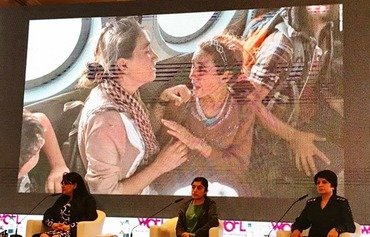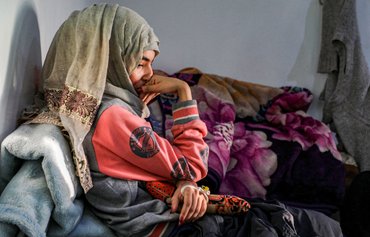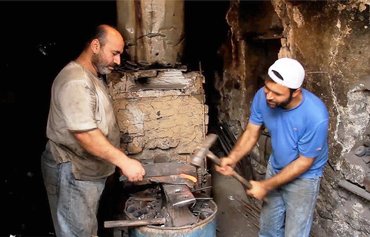Activists from the Iraqi Women Network are working to help individuals and communities that have suffered violence at the hands of the "Islamic State of Iraq and the Levant" (ISIL) to recover and move forward.
The 85 Iraqi organisations that comprise the network offer humanitarian services to various segments of society, but have focused on improving the conditions of internally displaced women and those who have suffered the ill-effects of violence.
The Public Aid Organisation (PAO), which is part of the network, has been working on finding "better living conditions for oppressed women, which would positively affect their families and communities", said PAO official Hana Hammoud.
As part of PAO's economic empowerment programme, the organisation reaches out on a daily basis to women who have been displaced from their homes or are survivors of terrorism, she told Diyaruna.
"We offer them support, counselling and sound planning for their small businesses so they can be successful," she said. "We have contributed towards the success and profitability achieved by these women, and we are very proud of them."
Government and civic institutions must encourage all people, including women, to tap into their full potential in order to rebuild cities recovering from the scourge of terrorism, Hammoud said.
"We have to spread a spirit of collaboration and peaceful co-existence and renounce anything that incites hatred and retaliation," she said.
Psychological support for survivors
Shatha Naji, who heads Women for Peace, told Diyaruna that violence perpetrated by terrorist groups has had disastrous effects on Iraqi women.
Her organisation seeks to address the psychological trauma of women survivors of terrorism and document their stories, she said.
"As part of our project, we documented 22 stories of women who survived ISIL," she said.
These stories, which have been gathered into a book, have provided a small sample of "the violations and crimes that have affected thousands of innocent people", she said.
Soon after ISIL overran Mosul, Women for Peace launched a psychological support campaign with the participation of the Ministry of Labour and other organisations within the Iraqi Women Network, Naji said.
Since then, 35 centres have been opened throughout the country.
The goal is to listen to women who have survived violence and to help them regain their self-confidence so they can go on to rebuild their lives, she said.
The centres have not only helped by treating hundreds of women, she said, but also have educated and trained others on how to deal with psychological crises.
Inspiring women to shape the future
Women should play an active role in shaping the country's future, said Hana Edwar, president of the Iraqi al-Amal Association.
"We are working to help women become efficient leaders in their family and community environments," she told Diyaruna.
The association has organised training workshops to raise up female leadership, and there have been some participants who have really stood out, Edwar said.
"For example, we currently have dozens of women in Kirkuk province who have been appointed as town mayors or community leaders and are taking an active part in leading and serving their communities," she said.
Other women have been actively engaged in "promoting a culture of peace and combating extremist ideology", she added.
Organisations in the network have been keen to work together to raise awareness on a larger scale about the dangers of social ills such as domestic violence and underage marriage, Edwar said.
Such problems can only be eradicated by extensive group efforts, she added.
Women hold leadership positions
In accordance with the Iraqi constitution, women hold 25% of parliamentary seats.
"What is remarkable is that 20 female members of parliament won seats in the 2014 parliamentary elections outside the designated quota, which is proof of growing confidence in women’s role and social standing," said Iraqi MP Intissar al-Jubury, who serves on the parliamentary women’s committee.
"Female parliamentarians have played a significant role in legislation and uncovering corruption, which is the other face of terrorism," she added.
They also worked with their peers in the executive branch as well as with female civic activists to expose the crimes of ISIL at an international level and to support its victims, al-Jubury said.
Al-Jubury, who represents Ninawa province in parliament, also cited women’s support for the battle to liberate Mosul.
In conjunction with the military operation to liberate Mosul that began October 17th, she said, she worked with other female parliamentarians from Ninawa and the Iraqi Women Network to launch an initiative to support civil peace.
The initiative included "a road-map to reinstate social stability by adopting a host of practical measures geared towards counterbalancing the effects of ISIL’s crimes, prosecuting the perpetrators and compensating the victims", she said.
"We hope to work together towards charting a better path ahead for our country," she said.

![Yazidi women who escaped the 'Islamic State of Iraq and the Levant' receive small business training in Shariya camp in Dohuk province. [Photo courtesy of Public Aid Organisation's Facebook page]](/cnmi_am/images/2017/03/21/7489-Iraq-Duhok-women-600_384.jpg)






